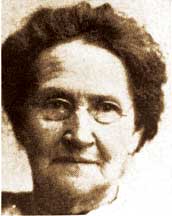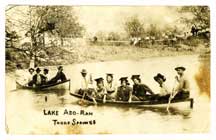 |
|
Ida Van Zandt Jarvis, in ca. 1899 photo, wrote a book of Texas poems, a copy of which is in the TCU library. Always interested in helping students, Ida used the proceeds from the sale of the book to set up a fund for ministerial students.
|
The trend of date-shy TCU men may find its roots in bygone days when restrictions for girls on campus were tighter than a corset. For example, writing a letter to anyone except one’s parents was strictly forbidden, and trimming bangs earned several girls a reprimand (cutting locks runs counter Scripture, it was said). One young woman who walked across campus with her brother was called before the faculty and told that others would not know he was a relative so she needed to avoid the appearance of evil.
In her unpublished 1930 thesis, Beginnings of T.C.U., Frankie Miller Mason recounted an incident during commencement week in 1882, when a student from the “boys’ dormitory” was called to the president’s office because he had been seen walking with a young lady who lived in town.
“This open disobedience of rules was the subject of the chapel talk. The offender was asked to stand that all of the audience might see the student to be expelled for breaking the rules.
When one of the finest young men of the senior class quietly arose, it astonished the faculty, but did not change the sentence. Before an hour had passed a petition was brought from the student body asking for a pardon and stated that the offenders of the evening before were to be married in two weeks. The petition also stated that nearly all of the students had stolen privileges at some time during the year.
 |
|
The canoe in the photo above (ca. 1892-95) carries Randolph (with beard) and Addison Clark (at bow) with Mr. Holloway (the math teacher). Clyde Haggard, bookkeeper and stock broker, is one of the rowers in the boat on right, which also carries Ruth Boyd, the girl with the mortarboard to the farthest right.
|
An assembly of students and visitors was called. The president stated the decision was final; there was no excuse for breaking rules, and all students who had done so during the year must consider themselves expelled.”
Fortunately for the boy, Ida Van Zandt Jarvis — wife of Board of Trustees President J.J. Jarvis (who later said she was the one who actually wrote the charter for Add-Ran Christian University in 1889) — was on the Thorp Spring campus for commencement.
“Mrs. Jarvis walked slowly to the girls’ dormitory where she found all in confusion, girls in nearly every room were packing trunks and weeping. The matron, almost frantic, said: ‘Something must be done, call a Faculty meeting.’
“Mrs. Jarvis replied: ‘Faculty nothing — there has been too much faculty now. Give me my umbrella, and I will attend to this.’
“She tied a large white handkerchief on top of the umbrella and went to the home of Mr. Addison. He was in the cow pen with Mr. Randolph, and both were in earnest conversation, seated under a live oak tree.
“Mrs. Jarvis marched up to them, waved her flag of truce and said: ‘Good morning, you seem to be in trouble.’ Mr. Randolph said: ‘I’ve been trying to talk some sense into him.’ Mr. Addison replied: ‘We are in deep trouble, and I wish you could tell us what to do.’
 |
|
The faculty of AddRan College, ca. 1890s. We have no information about the couple in the photo top center.
|
“Mrs. Jarvis had come prepared to do just that, and readily outlined the situation. It meant breaking up the school over a trifle, in the presence of hundreds of visitors from all over the country. She ended by saying there was only one thing to do: ‘Take back what you have said and forgive them.’
“Mr. Addison looked down in deep though for some moments. Then the humor of the whole situation appealed to him, and he threw back his head and laughed heartily. He called an assembly at once and not only revoked the sentence but gave the students full privileges for the entire week. Mrs. Jarvis was a heroine.”
Stories and quotes are drawn from the unpublished 1930 thesis Beginnings of T.C.U. by Frankie Miller Mason, which are quoted in History of Texas Christian University: A College on the Cattle Frontier by Colby D. Hall, 1947. |
Your comments are welcome
Comments
Related Reading:
Mem’ries Sweet
Trading Places
The Big Switch gave a student a taste of the chancellor’s day while the chancellor went back to class.
Recollections
Which Organization or Club Was Most Important to You as a TCU Student?
Marching Band — it’s where I met almost all my friends. Barbara Dunlap ’96 (MATM ’18) TCU student House of Representatives, Dorm Council, fraternity, Faculty Senate, TCU administration, athletic administration, the Skiff, trustees, but individual students and faculty taught me the most. Charles Thompson ’71 TCU Skiff! Alfred Charles ’92 I was fortunate to be